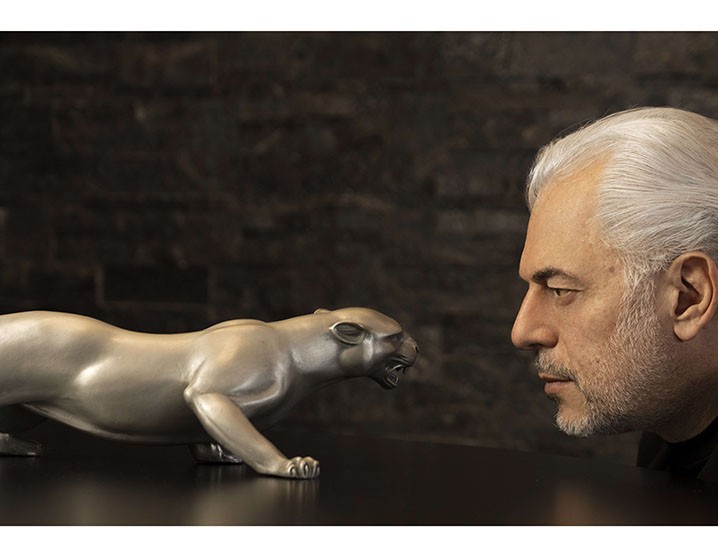News - Advertising
Philippe Skaff: ‘I Was an Arrogant Proclaiming His Genius’
by Ghada Azzi
April 17, 2019
.jpg) Advertisement
Advertisement
How do you feel about the advertising business today?
With all the innovation that is happening, I feel a renewed excitement about this field. All this technological revolution has given us communicators highways of powerful tools to be able to drop the elitist stand we used to have vis-à-vis our audiences and adopt a humbler stand. Audiences are now participating in shaping the communication ecosystem – they are an integral part of it, communities at large rule. It is no longer about us, what we think is good for them, or what we think they can or cannot understand. It’s about them dictating to us their views, their tastes, their own evolutionary mindsets.
I know this is not an answer you would expect from a veteran like myself, but I am really amazed by what has happened over the past decade. What remained normative and repetitive through the 19th century up to the 20th has exploded, decomposed, literally disintegrated.
Ever since the global world became really global through the three or four screens there is a “first time" almost every time. There are no more seasons; there are moments. There is no more unprecedented advertising; there is a free current or currents of advertising that is ever morphing and instantly changing, and frankly it is irresistible.
Of course, it has created a totally new world of communication, leaving all that was taken for granted behind for good. And leaving us, the old-school admen, the traditional tribe, confused but bewildered, lost but hopeful, shocked but still believers. I for one believe that formulas we used for decades were ending up killing our imaginations, confining us to what we believed was our truth. Today, it’s democracy in the communication business. Liberalism still prevails of course, but it has added a social as well as a societal dimension that we cannot ignore. These dimensions, which were the privilege of researchers, are alive and kicking with every click.
We have to adopt a new mindset, think differently, and surrender to progress. It’s not easy. But hey, we have great teachers out there – our kids.
"MENA? What MENA? If MENA stands for “Middle East and North Africa”, then I have news for you. It is long dead... “
How has the MENA advertising evolved?
MENA? What MENA? If MENA stands for “Middle East and North Africa,” then I have news for you. It is long dead. I would even say it never really existed. Maybe in the heads of accountants eager to consolidate figures under a geographical space. The apparent justification was of course the unity of language. The reality was and still is so different.
Our populations are actually separated by the same language. The problem is that language feeds a Western illusion of unity. There is no MENA. Historically, politically, culturally, economically, it is so different from one country to another, dare I say even in terms of religion from one space to another.
There is the GCC, then there is the Levant, then there is Egypt, and finally the Maghreb countries. And even that is still a simplification. There are products and services, mainly made in what is called the First world, and there are communities in this big space, consuming, within different flags and armies, and absolutely different immunities to messaging.
“I was an egotistical creative person. I had no real allegiance expect to myself. I was an arrogant proclaiming his genius. […] I am now however, proclaiming my Mea Culpa, because I know now that I was living behind a smoke screen.”
This may be changing now. But not thanks to local evolution. What you have now is a space that is “globalizing" with the domination of world technological advancement. That is happening for sure. It is a fact. I don’t remember how many times I tried in my past life to combine different campaigns to different countries in what you call MENA. And every time I lost. MENA exists, I repeat, simply because the math did not add up for advertisers in terms of costs. Insufficient money for each market meant we were asked to consider creating campaigns for “MENA.”
There was such a discrepancy with the buying power of these populations, and the respective cost of reaching them through media, notwithstanding the firm borders separating them culturally, that most of time I had two choices: either produce a campaign that looked more like a sliced pizza or aim at the lowest denominator. All that to satisfy the artificial MENA region. It was a nightmare every time. Can I talk about a MENA standard? Of course not. Nobody could, and everyone was faking not knowing the truth.
The new tech world is slowly liberating these areas, oddly unifying it. Their new generations are getting more and more similar, and they are rapidly jumping all the cases and now seem destined to become part of a universal audience. There is a major movement that the new world has triggered in these societies. It is called the 21st century.
So, to cut a long story short, the so-called MENA has never evolved because it never existed, but the area you are referring to is evolving, with the rest of the world. Simply, once you understand that, you fire all the old-school ad groups operating in the region and replace them with a generation that speaks the new alphabet. Dinosaurs who still operate over here speak a dead language.
Listen to the youth – They will tell you another story, a new story.
“We thought of ourselves as the elite. With no real ideology whatsoever, we expected to get as many girls in our laps, as much money in our pockets, and as many awards home as possible.”
What are the things you miss most about advertising in the good old days? Could you point out some of the good old things that you believe no longer exist? And are you nostalgic about the good old advertising years?
It’s funny how you keep referring to the “good old days.” Want to talk about the good old days? Ok. I will tell what the essence of the “good old days” was. We had a free run then. I don’t want to speak about others but I was an egotistical creative person. I had no real allegiance except to myself. I was an arrogant proclaiming his genius. That was what our “tribe” was good at doing. We took advantage of a particular situation.
I am now however, proclaiming my Mea Culpa, because I know now that I was living behind a smoke screen. Yes, I had a great time. Yes, I was highly paid because I was a horse that used to win the stable owners lots of money. Yes, hundreds of Middle Eastern youth would have loved to be in my place. But hey, I did it because I sort of was there first. I was coherent in creating success, and pocket it.
But that is the problem with this era. We thought of ourselves as the elite. With no real ideology whatsoever, we expected to get as many girls in our laps, as much money in our pockets, and as many awards home as possible.
When I moved here from Canada, there were two or three creative heads in as many as 20 agencies. That was all. Instead of nurturing “creative people,” agencies were either adapting foreign campaigns, or leaving it to some talented illustrator to come up with “something.”
I know I may be too hard on myself, but I owe the historical truth to the new generation that is way more talented these days. Of course, I miss friends I made, thrills I lived, the life of a nomad flying all over the world producing small TVCs in the Far East, Australia, all the way to both the Americas, passing through all of the European centers, and the ones of African continent.
These where the old days. Of course I miss them. But for the wrong reasons. For selfish reasons. Yes. I loved and enjoyed it, it made me what I am today. But frankly, the ad scene was not necessarily better.
It’s been 10 years now that I left Grey, and I am busy creating Spectacles and Musicals, as I think creativity shifted to “live" shows. That is why I co-founded ‘Multiple International’ with my longtime collaborator and friend, who also comes from the Grey network days, Wassim Rizk.
“We have to adopt a new mindset, think differently, and surrender to progress. It’s not easy. But hey, we have great teachers out there, our kids.”
But I also started last year building a new network in our area, ‘Hopscotch’-- a Parisian international group, one of the best and last independent groups practicing next-generation communication-- a venture partnering also with Omar Nasreddine and Ghassan Khairallah, equally old timers at Grey. And you know this new media thing has humbled me a lot. Multiple is bringing all the satisfaction I need, but the new generation of the communication works fascinates me. I wanted in. And I am.
How do you characterize the work coming out of the region? What's your stance vis-à-vis creativity made in the Middle East today?
The answer to your question is simple. Frankly it greatly lacks flavor. I explained to you earlier that I was what I was at Grey because I was an arrogant egocentric creative. But at least I dared, I challenged, I took risks and made my clients take risks. I tried as much as I could to have game-changing campaigns. Landmarks.
Some of these campaigns are still remembered 10, 15 years later. But today? I am very sad. It seems that creative people are living on the ruins of the old-school creatives, not reinventing the field. I don’t see the industry rising up with a new generation of challengers. Maybe there is less money in the game. But that never stopped us at the beginning of our career.
Less prestige to massage egos? Maybe. I don’t know. But tell me, who are the creative stars today? Does anyone know their names? We were a few back then. Good or bad, this is not the point, but there were real fights then. I don’t hear the rumbling of battles anymore. This love story that is between a creative person and his work, has no love in it anymore. At least I don’t feel it. There is plenty of stuff on the net that beats by far what the so-called creative agencies are producing now. Why is it so? It puzzles me.
I have a harsh view, I know. But brutal honesty can move things forward. In any case, I am now coaching some great new talents in Hopscotch. Maybe they and I will have a second chance to turn things around. Come on, you cannot see what you see of what is now called “campaigns” and be satisfied. And not do anything.
“It seems that creative people are living on the ruins of the old-school creatives, not reinventing the field. I don’t see the industry rising up with a new generation of challengers.”
What do awards mean to you personally?
Anyone who says it does not mean anything to win awards in our industry is simply not being truthful. Awards start careers. But I think one should be honest with oneself. One should ask the million-dollar question: “Do I deserve it” or is it cooked by the agencies’ bosses, or is it the clients’ influence that helped get it? Did I really write it or did I nick it from a forgotten campaign archived somewhere, somehow?
Does it live up to international standards or is it part of a commercial evening, which ultimately makes money to the organizers by being nice to some local agencies with international names who book and pay for big round dinner tables? If the answer is none of the above, yes, an award is a nice thing to land.
You just inaugurated the new offices of Hopscotch but also of Multiple International. Can you tell us more about Multiple?
“Multiple International” is a creative project company. It specializes in live spectaculars, live ceremonies, and live opérettes – Musicals. Live, live, and more live. It is quite a polyvalent company that federates the best in class in theatrical, cinematic 3D content, music, dance and lately acrobatics, from Australia, Canada, the U.K., France, and of course artists, and performers from the region and the world, all this mixed with great storytelling skill.
I got hooked on the “live” aspect of shows, not only because unlike “movies and commercials” there is no room for mistakes, no editing, no grading – in other words no cheating – but also because with the technological revolution shows are now an experience where all creative disciplines can and are represented. You dream a show up, and there you are. You have an audience watching you live, and the emotions are there before your eyes. You can tell immediately if you have succeeded or not. It is the greatest feeling of all for a creative mind, being judged on the spot. You prepare for a year, and in an hour and a half you know if your show is the greatest, or the worst.
It’s an addictive art form where every component has been thought of and delivered live. Among our big projects was “Cluster of Lights,” a mega production about the birth of Islam that played in The Majaz amphitheater in Sharjah in 2014, and was staged again in Cairo in 2015. And now we will be staging “The Last Chapter” inspired from 1,001 Nights, opening in the same amphitheater on the April 23, 2019.
You and all your readers are invited of course. As in communication, live shows now obey a new world order. And what a beautiful new world order for art it is.






.jpg)


.jpg)




